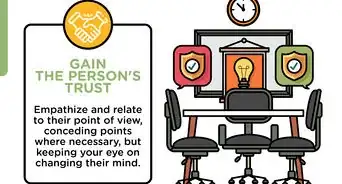This article was co-authored by Gale McCreary. Gale McCreary is the Founder and Chief Coordinator of SpeechStory, a nonprofit organization focused on improving communication skills in youth. She was previously a Silicon Valley CEO and President of a Toastmasters International chapter. She has been recognized as Santa Barbara Entrepreneurial Woman of the Year and received Congressional recognition for providing a Family-Friendly work environment. She has a BS in Biology from Stanford University.
This article has been viewed 36,159 times.
It is commonly believed that only people with high self confidence can speak in large group settings or doing public speaking. In fact, in a 2001 Gallup Poll, 40% of the respondents said they are afraid of public speaking; these fears come only second after the fear of snakes! It means that many people think they don't have the level of confidence needed to speak in public.
The good news is, the reverse is also true. Meaning, you can gain more confidence by speaking in public. Author and speaker Dale Carnegie listed four essential steps to gain self-confidence through speaking in public.
Steps
Preparation
Dale Carnegie said in his book: “You can't feel confident unless you know what you are going to say.” Preparing to give a talk is also a good way to increase your confidence, because preparation is half the battle.
-
1Have a strong and persistent desire to speak in public. You need to have a positive attitude toward speaking in public instead of trying to avoid any assignments, requests or invitations that involve some sort of public speaking, such as speaking at birthdays, employee gatherings or the like. Start with the strong belief that you have what it takes to speak in public, and look forward to achieving more confidence after every public speaking engagement.
-
2Find a topic. Dale Carnegie in his book “The Quick and Easy Way to Effective Speaking” encourages us to: “Talk about something you have earned the right to talk about through experience or study.” Dig inside yourself to find the topic you want to talk about. It is the one that you know thoroughly, inside out. It includes your experiences, your hobbies, your expertise, and things that you have been studying deeply. These are the right topics for you.Advertisement
-
3Assemble and arrange your ideas. Many times, the topic you choose (or are assigned) is too general. You need to narrow it to become an appropriate base for your talk. For example, if your topic is automotive, you can narrow it to one of many aspects related to this topic: car design, fuel consumption, machine power, potential markets, potential buyers, or how to sell a car. Which aspect is suitable for you depends on your experience, training, education, and your background. Collect all the ideas that you want to talk about and put them on index cards. This will make it easier for you to arrange and organize your thoughts.
-
4Structure your talk. Once you decide what you want to talk about, you need to arrange or structure your thoughts in easy to understand flows of thought. When organizing your message, think in threes. Such as: “Three Steps to…”, “Three Keys of …” or “Three ideas on…”. It makes your talk concise, interesting and memorable. Can we talk more than three ideas? Yes, we can. But it will be easier for us to remember three points, instead of five, for instance.
-
5Rehearse your talk. Dale Carnegie suggests a very simple way to rehearse: use the ideas you have selected for your talk in everyday conversation with your friends or business associates. Instead of talking about last night game or latest movie during lunch, you can start of the conversation by saying, “Do you know that there are three steps to…?” if your friend is interested to listen to you, most probably your audience will too. Watch his reaction, listen to his responses. He may ask you something you do not think about or he may give you interesting ideas that will be valuable to improve your talk. You can even rehearse a story you want to talk with him, and see if he understand it, or if he laugh at your joke. Again, if he did not get your story or your joke, you need to improve the way you say it so your future audience can get it.
Gaining Confidence
-
1Think and act confident. Good preparation should increase your confidence, even before your give your talk. Capitalize on it by thinking positively about our ability to talk in public; envision you giving the talk successfully. Don't second guess yourself. Here are three things you can do to maintain the confident level when you give your talk:
-
2Take a deep breath. Breathe deeply for about 30 seconds before you face the audience. It will increase the oxygen level in your brain and helps you to focus, think clearly and remember your main points well. It will also calm your nerve and give you courage.
-
3Give yourself a pep talk. Pep talk is a short speech that is given to encourage someone to work harder, to feel more confident and enthusiastic. Is you telling yourself “you can do this” or “you will give the best talk” or maybe just a simple cheer like “go, go, go; success, success, success.” You can talk to yourself internally or you can find a secluded space and whisper it to yourself. Athletes use pep talk before their games; public speaker use pep talk before their speeches; why can't you use it too?
-
4Walk confidently. Draw yourself up and look your audience straight in the eyes. Don't walk feeling defeated, it will certainly show up in your talk.
Practicing
-
1Practice your talk or presentation and record it. Use a video camera, then review it later on. This is much better than practicing in front of a mirror. In front of a mirror you will constantly focus of yourself and how you look, while in a public speaking you should be thinking about the message and the audience instead of yourself. Once you are through with your practice, you can review the recording and “be the audience”; you will find things you like, keep it up; you will also see things you – as an audience – don't like; make a note to improve it next time.
-
2Grab every opportunity to speak, no matter how short it will be. Next time you attend a meeting, try to come with some issue to raise or comment on and contribute to the meeting. It may not seem like much, but if you do this consistently, it will increase your confident as well.
-
3Look and ask for feedback. If you present something in a meeting, notice how the audience reacts: do they look bored or interested? Do they seems to understand or just plain confused? If you are not sure, ask your friend or trusted colleague to give you inputs. Even if they may criticized you, it is still better then don't have any feedback at all.
Community Q&A
-
QuestionWhat if I make a mistake in my talk and that mistake can get me penalized?
 Community AnswerIf you know what you are talking about, it's not very likely you will make a significant mistake. If you do make mistake, quickly correct it. I have given many public speeches and the mistakes I make are usually minor. If you are prepared, you will do fine.
Community AnswerIf you know what you are talking about, it's not very likely you will make a significant mistake. If you do make mistake, quickly correct it. I have given many public speeches and the mistakes I make are usually minor. If you are prepared, you will do fine. -
QuestionHow do l know if my fear of public speaking is normal or it requires a therapist?
 Josie BottaCommunity AnswerIf you can talk in front of three-five people at once with just you talking for a longer period of time, then it’s fine. If you can’t even talk to a friend group, then that is a problem.
Josie BottaCommunity AnswerIf you can talk in front of three-five people at once with just you talking for a longer period of time, then it’s fine. If you can’t even talk to a friend group, then that is a problem.







































































